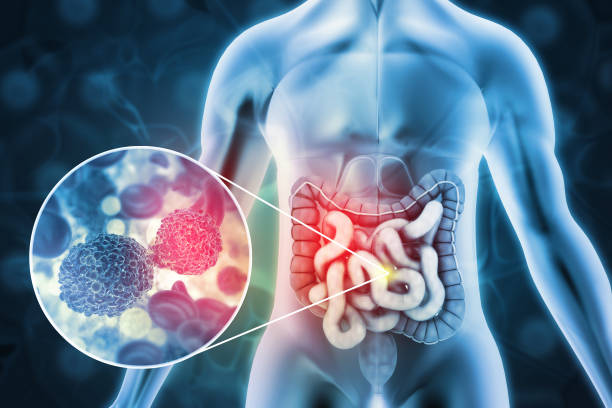Introduction
Colorectal cancer, also known as bowel cancer, is a type of cancer that affects the colon and rectum, which are the final parts of the digestive system. It is a common form of cancer, affecting both men and women, and is often preventable through regular screening and lifestyle changes.

Causes of Colorectal Cancer
-
Age: The risk of developing colorectal cancer increases as a person ages, with most cases occurring in people over the age of 50.
-
Family history: People with a family history of colorectal cancer or polyps are at a higher risk of developing the disease.
-
Personal history: People with a personal history of colorectal cancer or polyps are at a higher risk of developing the disease in the future.
-
Inflammatory bowel disease (IBD): People with IBD, such as Crohn's disease or ulcerative colitis, are at a higher risk of developing colorectal cancer.
-
Diet: A diet high in fat and low in fiber has been linked to an increased risk of colorectal cancer.
-
Physical inactivity: Physical inactivity has been linked to an increased risk of colorectal cancer.
-
Smoking: Smoking is a risk factor for many types of cancer, including colorectal cancer.
-
Alcohol consumption: Heavy alcohol consumption has been linked to an increased risk of colorectal cancer.
-
Other factors: Other factors that may increase the risk of colorectal cancer include obesity, a sedentary lifestyle, and a diet high in red or processed meat.
It is important to note that having one or more of these risk factors does not mean that a person will develop colorectal cancer, but it does increase their likelihood. Regular screening and lifestyle changes can greatly reduce a person's risk of developing colorectal cancer
Symptoms

- Blood in the stool
- Change in bowel habits
- Constipation or diarrhea that lasts for an extended period of time
- Abdominal pain, cramping, or bloating
- Unexplained weight loss
Risk Factors
- Age (most cases occur in people over 50)
- Family history of colorectal cancer or polyps
- Personal history of colorectal cancer or polyps
- Inflammatory bowel disease (IBD)
- A diet high in fat and low in fiber
- Physical inactivity
- Smoking
- Heavy alcohol consumption
Diagnosis
- Physical examination and medical history
- Stool sample test
- Colonoscopy
- Sigmoidoscopy
- Biopsy
Treatment Options for Colorectal Cancer
- Surgery
- Chemotherapy
- Radiation therapy
- Targeted therapy
Surgery: Surgery is the most common treatment for colorectal cancer, and it may involve removal of part or all of the colon or rectum. The type of surgery will depend on the location and stage of the cancer.
Chemotherapy: Chemotherapy uses drugs to kill cancer cells and shrink tumors. It can be given before or after surgery to increase the chances of a cure.
Radiation therapy: Radiation therapy uses high-energy beams to kill cancer cells and shrink tumors. It is often used in combination with surgery or chemotherapy.
Targeted therapy: Targeted therapy is a newer type of treatment that targets specific proteins in cancer cells. It is used in combination with chemotherapy or as a stand-alone treatment for advanced colorectal cancer.
Recovery and Outlook: The outlook for people with colorectal cancer will depend on several factors, including the stage and type of cancer, and overall health of the patient. With proper treatment, many people with colorectal cancer are able to recover and lead fulfilling lives. Regular monitoring and follow-up care is important to detect any recurrence of the cancer.
Prevention
- Regular screening
- Healthy diet with plenty of fiber and fruits and vegetables
- Regular physical activity
- Maintaining a healthy weight
- Limiting alcohol consumption
- Quitting smoking
Conclusion
Colorectal cancer is a serious condition, but with proper screening and treatment, it is often preventable and treatable. By understanding the risk factors, symptoms, and treatment options, people can take an active role in managing their health and improving their outlook. If you have concerns about colorectal cancer or notice any changes in your digestive health, it is important to speak with your healthcare provider as soon as possible.
FAQs
-
What is colorectal cancer?
Colorectal cancer is a type of cancer that affects the colon and rectum, which are the final parts of the digestive system. It is a common form of cancer and can be preventable through regular screening and lifestyle changes. -
What are the risk factors for colorectal cancer?
Risk factors for colorectal cancer include age (most cases occur in people over 50), family history of colorectal cancer or polyps, personal history of colorectal cancer or polyps, inflammatory bowel disease (IBD), a diet high in fat and low in fiber, physical inactivity, smoking, and heavy alcohol consumption. -
How is colorectal cancer diagnosed?
Colorectal cancer is typically diagnosed through a physical examination and medical history, stool sample test, colonoscopy, sigmoidoscopy, and biopsy.
-
Is surgery the only treatment for colorectal cancer?
Surgery is the most common treatment for colorectal cancer, but it may be used in combination with chemotherapy, radiation therapy, or targeted therapy. -
What is the outlook for people with colorectal cancer?
The outlook for people with colorectal cancer will depend on several factors, including the stage and type of cancer, and overall health of the patient. With proper treatment, many people with colorectal cancer are able to recover and lead fulfilling lives. -
How can colorectal cancer be prevented?
Colorectal cancer can be prevented through regular screening, a healthy diet with plenty of fiber and fruits and vegetables, regular physical activity, maintaining a healthy weight, limiting alcohol consumption, and quitting smoking. -
When should I speak with my healthcare provider about colorectal cancer?
If you have concerns about colorectal cancer or notice any changes in your digestive health, it is important to speak with your healthcare provider as soon as possible. Early detection and treatment can greatly improve the outlook for people with colorectal cancer.











